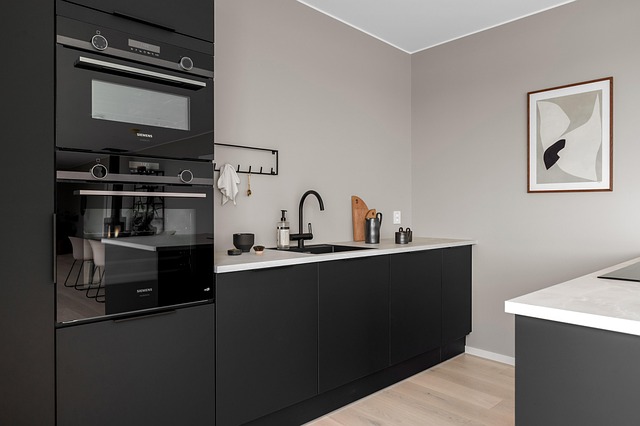Choosing durable kitchen countertops involves considering materials like granite, quartz, wood, laminate, concrete, and stainless steel, each with unique pros and cons. Natural stones like granite offer beauty and strength but require sealing, while engineered quartz stands out for its durability, scratch resistance, seamless construction, and easy cleaning, making it ideal for low-maintenance kitchen worktops. The best choice aligns with your style, budget, and lifestyle needs.
“Transform your kitchen with the perfect countertop! In today’s market, an abundance of options cater to every style and budget, from classic elegance to modern trends. This guide explores the wide range of durable materials available, helping you navigate the choice. Discover the pros and cons of popular durable kitchen countertops, including granite, quartz, and more. Learn about trending styles, classic choices, and installation tips for a seamless, long-lasting upgrade.”
- Durable Materials for Kitchen Countertops
- – Exploring popular durable options
- – Pros and cons of each material
- – Durability factors to consider
Durable Materials for Kitchen Countertops
When it comes to durable kitchen countertops, material choice plays a significant role in ensuring longevity and ease of maintenance. Opting for robust materials can withstand heavy use, resist scratches and stains, and preserve their aesthetic appeal over time. Popular options include granite and quartz, both renowned for their natural beauty and superior strength. Granite, a timeless classic, offers a wide range of patterns and colors, making it highly versatile in various kitchen designs. Its non-porous nature makes it extremely hygienic, as it’s easy to clean and resistant to bacteria growth.
Quartz, on the other hand, is man-made but boasts remarkable durability. It’s crafted from ground minerals and resin, resulting in a surface that’s both scratch-resistant and non-porous. This characteristic prevents liquids from seeping into the countertop, minimizing the risk of staining or water damage. Quartz also offers excellent heat resistance, making it a practical choice for food preparation areas. Moreover, its seamless construction eliminates joints, creating a smooth, continuous surface that’s easy to keep clean.
– Exploring popular durable options
When it comes to durable kitchen countertops, materials like granite and quartzite top the list for their natural beauty and longevity. These options are not only visually appealing but also highly resistant to scratches, stains, and heat, making them ideal choices for busy kitchens. Granite, in particular, is a popular option due to its unique patterns and textures that add character to any space. Its hard surface makes it easy to clean and maintain, ensuring your countertop stays looking as good as new for years to come.
Quartz countertops are another durable kitchen choice, offering a wide range of colors and finishes. Unlike natural stone, quartz is man-made, which makes it consistent in appearance and easier to maintain. This material is also non-porous, preventing liquids from seeping in and causing stains or damage, making it a practical option for those who want both style and functionality. With proper care, these durable kitchen countertops can enhance the overall look and feel of your space while withstanding the demands of daily use.
– Pros and cons of each material
When considering countertop options for your kitchen, understanding the pros and cons of each material is essential for making an informed decision. Durable kitchen countertops are a popular choice among homeowners due to their longevity and ability to withstand heavy use. Natural stones like granite and marble offer exquisite aesthetics and can increase a home’s value, but they require specialized care and may be prone to chips or cracks. On the other hand, quartz is a hard surface that combines natural stone with resin, providing excellent durability and ease of maintenance, though it might not offer the same level of visual uniqueness as natural stones.
Wood and laminates are budget-friendly alternatives, with wood offering a warm and inviting look. However, they may not be as durable as other materials and can dent or scratch easily. Laminate countertops are easy to install and maintain but lack the natural appeal of wood and are more susceptible to water damage. Concrete and stainless steel are industrial-chic options known for their versatility and customizability, but they require professional installation and can be cold and hard underfoot. Each material has its strengths and weaknesses, so choosing the right one depends on your personal style, budget, and lifestyle.
– Durability factors to consider
When considering durable kitchen countertops, it’s essential to look beyond aesthetics and focus on materials that can withstand heavy use and various elements. Natural stone like granite and marble is renowned for its longevity, offering a classic and trendy option that can last for decades with proper care. However, these materials are porous and require regular sealing to prevent staining and damage from moisture and oils.
On the other hand, engineered quartz and solid surface countertops offer excellent durability without the same level of maintenance. These man-made surfaces are highly resistant to scratches, cracks, and stains, making them a popular choice for busy households. They’re also non-porous, which means they don’t absorb liquids, simplifying cleaning and limiting potential damage over time, thus ensuring your investment in durable kitchen countertops remains just that—a solid and long-lasting one.
When it comes to durable kitchen countertops, the options are vast. From classic materials like granite and quartz to trendy alternatives such as marble and concrete, each offers unique aesthetics and performance benefits. By understanding the pros and cons of each material, you can make an informed decision that not only enhances your kitchen’s style but also stands the test of time. Remember, the right countertop choice ensures both beauty and functionality for years to come, making it a crucial investment in your home.
